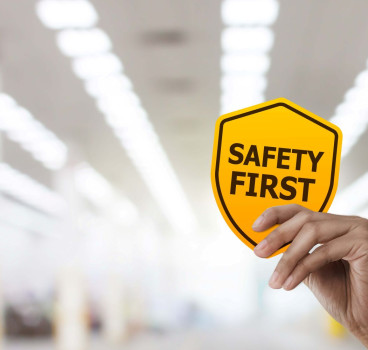Mental illness in the construction industry
Earlier this year, data released by the Office for National Statistics revealed the risk of suicide among low-skilled male laborers, particularly those working in construction, was three times higher than the national average. Mental illness has long been considered something of a taboo subject within the building industry, leading to companies such as BriggsAmasco, the UK's leading national commercial roofing company investing in training schemes designed to educate employees and help them recognise the symptoms of psychological stress. Dave Maginnis, Managing Director at BriggsAmasco, talks about the education programme and his company's aim to highlight issues surrounding ‘the invisible illness'.
Construction is a tough environment to inhabit. The physical demands are heavy and the pace at which workers have to toil is unrelenting. There are also mental pressures. Deadlines need to be met on a daily basis to satisfy a seemingly never-ending chain of command that begins with the client, but can include a host of contractors and various trades which are dependent on a person a lot further down the line getting their bit right for a project to proceed at sufficient speed. Therefore, it's fair to say the building industry, particularly the roofing sector, is not for the faint-hearted.
If we concur with the stereotypical view, then construction workers are as tough as the materials in their possession; they're insensitive to the perils they face in their line of duty, and they're mostly easy-going types whose hard-earned brawn has insulated them against the fears and anxieties felt by those engaged in less-rigorous employment. The reality is somewhat different, however. This is borne out by figures that reveal one-in-six construction-based workers are suffering from a form of mental illness. The fact that suicide kills more people in the building sector than falls is even more daunting. Thankfully, it appears the industry itself is becoming aware of the health issue in its midst. Initiatives such as Mates in Mind, a recently-launched charitable programme designed to improve and promote positive mental health in construction, has the backing of the British Safety Council, the Health in Construction Leadership Group, and the Samaritans. However, when it's considered a 2006 CIOB report, showed 70% of workers suffered from stress-related mental conditions as a direct result of working in the industry, its clear employees within the sector should be taking a firmer lead on ways to address the issue.
Warning signs
In June, BriggsAmasco staged a workshop for employees to help them recognise signs of mental health problems and encourage individuals to seek the right help. It was held as part of our annual Health and Safety forum on behalf of contract-related staff and subcontractors.The Mental Health First Aid coursewas delivered by a qualified, external trainer to ensure an effective and efficient approach was taken in relation to the subject. People often respond better to an outsider with a proper understanding of the topic they are delivering, and our aim was to ensure that our employees fully-absorbed the message being conveyed.
Staff interaction was encouraged throughout the course by sharing knowledge and personal experiences of the illness in an open-floor environment. Details were also shared on various mental health issues, and the warning signs to look out for, such as stress, anxiety and depression, that could indicate someone has a condition. The feedback from colleagues who attended the course was extremely positive. Most told us they found it incredibly insightful and gave them a new approach in their thought process regarding mental health issues. This was precisely the result we were hoping for.
BriggsAmasco has covered more than 1,000 hours in health and safety training and awareness through internal and external courses. We also hold annual health surveillance assessments for our 200-plus safety-critical employees in which a detailed wellbeing assessment is carried out by a medical professional. This robust approach to the welfare of staff led to the company achieving ISO, 9001, 14001 and 18001 – one of a few UK organisations to meet all three standards.
Adapting to change
Health and Safety is paramount at BriggsAmasco. However, with so much focus being applied to the day-to-day safety aspect; the health issue is sometimes left in the background. Therefore, we felt it extremely important to raise awareness on the subject of mental health and reassure our employees that the support is there if and when required. Mental health issues reportedly account for people taking nearly 70 million days off sick per year – the most of any health condition – costing the UK economy between £70 billion and £100 billion a year. Proof, therefore, the ramifications of this debilitating condition can travel far beyond the distress it causes an individual.
The construction industry has been viewed by some as resistant to adapting to changes in working practices and behaviours, but it's been swift to act in relation to a hitherto unspoken issue: the psychological wellbeing of its employers. At BriggsAmasco, we are aiming to overturn the negative view of mental illness and open-up discussion about its causes, symptoms and diagnoses. In our opinion, the construction industry should approach the welfare of its members with the same precision applied to a high-profile building or engineering project, which means paying as much attention to the interior, as well as the exterior details.
Additional Blogs

4 Must-Follow Health and Safety Habits for the Modern Jobsite
The risks in modern jobsites are constant. Falls, chemical exposure and heat illnesses continue to injure workers across construction and related industries each year. The best way to reduce those...
Read moreDesigning multi-functional outdoor spaces through the power of Play Trees
Outdoor spaces are increasingly expected to do more than simply look good. They must invite interaction, support wellbeing, encourage movement and foster connection across generations. In schools,...
Read more

4 Ways Resilient Construction Gets it Right and 4 Ways It’s Still Falling Short
Climate change is becoming increasingly disruptive as the weather becomes stronger and more unpredictable. These circumstances are constantly pressuring the construction industry, which has had to...
Read more